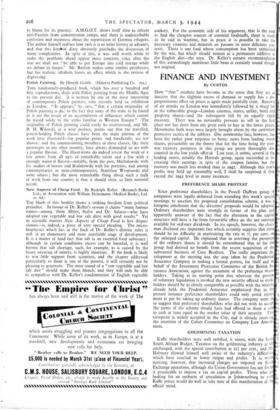FINANCE AND INVESTMENT
By CUSTOS
How " thin " markets have become in the sense that they are so inactive that the slightest excess of demand or supply has a dis- proportionate effect on prices is again made painfully clear. Renewal of air attacks on London was immediately followed by a sharp fall in the vulnerable group—London cinemas, i stores, utility, hotel and property shares—and the subsequent lull by an equally rapid recovery. There was no noticeable pressure to sell in the first place nor has there been any great rush to buy at the lower prices. Movements both ways were largely brought about by the customary protective tactics of the jobbers. One noteworthy fact, however, has been the rather poor response to better news from leading stores shares, presumably on the theory that for the time being the post- war recovery prospects in this group are pretty thoroughly dis- counted in the low yields offered. Last year, it seems, several of the
..
leading stores, notably the Harrods group, again succeeded in in- creasing their earnings in spite of the coupon famine, but the recovery was much less marked than in 1942. Although this year's r1 profits may hold up reasonably well, I shall be surprised if they exceed the 1943 level in many instances.
PREFERENCE SHARE PROTEST
Since preference shareholders in the Powell Duffryn group of companies were legally debarred from attending this week's special meetings to sanction the proposed consolidation scheme, it was a foregone conclusion that the directors' proposals would be adopted. Ordinary shareholders were strongly in favour of the plan and apparently unaware of the fact that the alteration in the capital structure will have a far from favourable effect on the net earnings available for ordinary dividends. In his speech, however, the chair- man disclosed one important fact which certainly suggests that there should be no difficulty in maintaining the rate at 75 per cent. on the enlarged capital. He explained that in assessing the prospects of the ordinary shares it should be remembered that so far the group had derived no benefit from the recent acquisition of the substantial business of Cory Brothers. The really important de- velopment at the meeting was the step taken by the Prudential Assurance Company in making a formal protest, for itself and on behalf of the Investment Protection Committee of the British In- surance Association, against the treatment of the preference share- holders. Taking as its starting point that wherever the process of voluntary liquidation is invoked the new security offered to stock- holders should be as closely comparable as possible with the security already held, the Prudential Assurance emphasised that in the present instance preference shareholders could only avoid repay- ment at par by taking up ordinary shares. The company went Oa to suggest that preference shareholders who did not wish to acce the terms of the scheme should have had offered to them a sum in cash at least equal to the market value of their security. This viewpoint is widely accepted in the City, and is already receiving the attention of the Cohen Committee on Company,Law Amend- ment.
Kaffir shareholders were well satisfied, it seems, with the latest South African Budget. Taxation on the gcldmining industry is 1 unchanged, with the special contribution at 225 per cent., and Mr Hofmeyr showed himself well aware of the industry's difficulti which have resulted in lower output and profits. It is worth noticing, however, that increased charges are imposed on St 'Exchange operations, although the Union Government has not fou it practicable to impose a tax on capital profits. Those who looking for an outburst of speculation in Johannesburg to ra Kaffir prices would do well to take note of this manifestation of th official mind.
GOLDMINING TAXATION


























 Previous page
Previous page